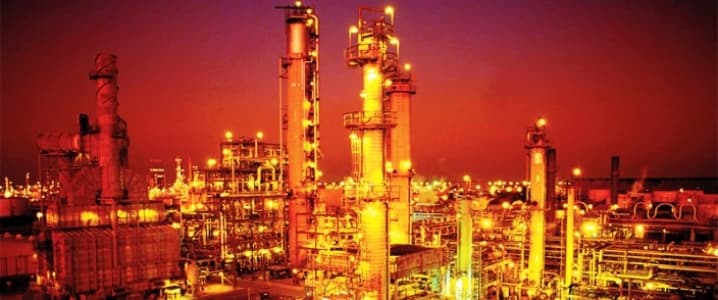When Hurricane Harvey blew into Texas last weekend, it dumped more than 30 inches of rain, flooding Houston and large areas of southeastern Texas, while leaving thousands homeless or without power. The worst storm to hit the U.S. since 2004 and by some estimates the largest rain-storm in U.S. history, Harvey has had a profound impact on the nation’s largest oil-producing and oil-refining region.
Refinery shutdowns, pipeline closures and other consequences of Harvey has sent the Gulf oil industry into a tailspin while throwing oil markets into disarray. The question facing industry analysts, investors and consumes is how long this chaos will last.
The storm forced several major Gulf refineries to shut their doors and limit operation. ExxonMobil and Total shut down facilities in the Port Arthur and Beaumont areas, while Valero, Marathon and Citgo were forced to reduce operations in refineries from Corpus Christi to Galveston Bay and Texas City.
Motiva, owned by Saudi Aramco, is the largest refinery in the U.S. with a total throughput of overly 600,000 bpd. It was forced to close at 5 a.m. on Wednesday August 30, having already reduced capacity by forty percent on Tuesday. Related: Can Mexico Capitalize On This Golden Oil Opportunity?
In total, some twenty percent of U.S. refinery capacity was affected by the storm. On Tuesday Platts reported that eighteen percent of capacity, or 3.36 million bpd, had been shut-down, while vessel traffic to coastal facilities in Corpus Christi had largely ceased. Another ten percent of capacity remains threatened as the storm moves East.
The shut-downs have sent gasoline prices soaring, offering lucrative opportunities to European refiners and depressed crude, which continues to struggle with over-supply and is now limited by the sudden loss of refinery capacity in the Gulf.
The closures have come as a result of the extreme weather, which in some cases has flooded facilities or rendered them inaccessible. A key factor is accessibility for staff: with millions affected by flooding and roads and highways turned to flowing rivers, it’s difficult for Houston’s thousands of oil and gas workers to resume their jobs.
On Wednesday, the Colonial Pipeline Co. shut down its major diesel and jet fuel line carrying Gulf products to East Coast markets. On Thursday, it shut down its gasoline line, following the Explorer Pipeline which had already closed its fuel line, citing dwindling supply. The drop in pipeline traffic has sent product prices soaring, with gasoline registering its highest price since 2015 on the New York market.
After a summer of low gas prices, the price at the pump looks set to soar above $2.50 on average for the Labor Day holiday, as supplies of products and low pipeline traffic limit access. If refineries take too long to come back on line, there could be shortages of fuel oils in some markets.
One analyst, commenting on the shut-down to CNBC, cited flooding inside the refinery itself as a reason for the shutdown, arguing that it would take six to eight weeks for capacity to recover.
It is difficult to know how long the recovery will take, as Harvey turns towards Louisiana and dumps even more rain on yet another oil and gas processing hub. In the meantime, operators are picking up the pieces.
Valero announced on Tuesday it was prepared to resume operations at Three Rivers and Corpus Christi, bringing 380,000 bpd back on-line. Marathon will be restarting its Galveston Bay plant on Thursday, as well as its refinery in Texas City.
The key to re-starting refineries will be draining the water that flooded the facilities in order to allow staff to return and operations to resume. According to Bloomberg, restarting Motiva will depend on when flood waters begin to back away and staff can return to work. Corpus Christi, which lays just outside the worst path of the storm, is seeing a return to work, as Valero and others bring their refineries back on-line. Facilities in Port Arthur or closer to Houston may take a lot longer.
Obtaining hard information on damage to refineries remains difficult as companies survey the damage. Reticence to report the scale of the storm’s impact is partly due to concerns over the possible environmental impact.
ExxonMobil admitted on Tuesday that Hurricane Harvey damaged two of its refineries, resulting in the release of pollutants from its Baytown refinery, the second-largest in the U.S. The report came as residents of Houston reported an “unbearable” chemical smell wafting over the city, according to the Washington Post. These reports were coming in for about two days before ExxonMobil acknowledged what had happened. Related: Russia’s Comeback In The LNG Race
NBC News reported that 2 million lbs. of hazardous airborne pollutants had been released by the storm. It can be difficult to determine whether such pollutants were released as a result of the storm’s damage to facilities, or were voluntarily released by refinery operators themselves in the course of shut-down activities.
It could take a long time to determine how much damage was caused by the storm. Judging how long products markets, pipelines and crude prices are affected by Harvey is difficult, but the trend right now would appear to indicate a slow recovery in refinery operations, as the flood waters recede and facilities are gradually brought back on line.
By Gregory Brew for Oilprice.com
More Top Reads From Oilprice.com:
- Failed Oil Price Recovery Slams Energy Stocks
- Iraq’s Solution To Lower For Longer Oil Prices
- Are Libyan Oil Production Gains History?



















So what do you do to remain self-reliant in future catastrophes? Get an electric car! Even better an electric truck like the Bollinger B1.